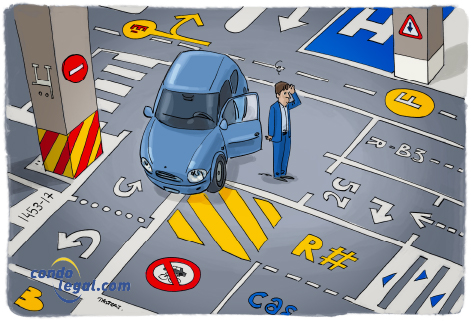
December 17, 2023 — In a judgment of the Court of Québec, the Honourable Louise Lévesque recalled the respective duties of a real estate broker and a notary during a transaction involving parking spaces in a divided co-ownership.
First of all, it should be remembered that the legal status of parking spaces may differ from one co-ownership to another, depending on what the declaration of co-ownership (Constituting act of the co-ownership) provides. These vehicle parking spaces are either in the basement or outside a building, and a distinction must be made between spaces designated as private portions and those that may be characterized as common portions or common portions for restricted use.
The Facts
Following the purchase of their housing unit in a divided co-ownership, the buyers accused both the real estate broker and the notary of professional misconduct for failing to verify the number of indoor parking spaces included in the fraction of the co-ownership they were acquiring.
Issues
Liability of the Defendants
The real estate broker has an obligation to demonstrate the accuracy of the information he provides through relevant documentation and is responsible for all information he disseminates.
The notary has the obligation to verify the title deeds and advise the parties to the deed of sale. They must ensure that the statements made by the seller are accurate and that the sale is valid and effective. If the notary fails to fulfil his obligations, he may be held liable for the damage caused.
The Judgment
The court concluded that the real estate broker had misled the buyers by falsely publishing on the description sheet that the dwelling unit had two indoor parking spaces, without verifying its veracity. However, he is required to act with prudence and diligence, which he has failed to do. He thus committed a fault towards the plaintiffs which caused them harm, engaging his extra-contractual liability. He must be held liable for the damage caused in this way.
In this regard, Justice Louise Lévesque recalled the teachings of Justice Henri Richard, when he was a lawyer, in his book on real estate brokerage in Quebec. The latter stated that: Case law teaches that a real estate agency or broker becomes extracontractually liable to third parties if he or she provides false information, since he or she must always be able to demonstrate the accuracy of that information.
In the circumstances, Justice Louise Lévesque concluded that it was the real estate broker's responsibility to verify the information he provided on the description sheet intended for potential buyers, in this case the applicants, and to demonstrate its accuracy. He had to go beyond the information provided by the saleswoman. By providing the buyers with incorrect information as to the number of parking spaces for sale, the real estate broker incurred liability to them, since he misled them.
As for the notary's liability, the judge recalled that the notary must ascertain the facts essential to support a deed or agreement and inform his client of the formalities necessary for its validity and effectiveness. The notary must also carry out an examination of the deeds to ensure the legal certainty of the transactions he executes, even if he does not have specific instructions on this subject from the parties to the deed. In the circumstances, the court concluded that the notary did not act with prudence and diligence and that she should have further investigated the purchasers' entitlement to the use of two indoor parking spaces.
Compensation
The court concluded that the broker and the notary had committed an independent fault with respect to the purchasers which, on its own, caused damage to them. For the reasons set out in the judgment, the broker was ordered to pay the purchasers the sum of $8,400 with interest at the legal rate and the additional indemnity provided for in article 1619 of the Civil Code of Québec. As for the notary, she was ordered to pay the sum of $4,800 with interest at the legal rate and the additional indemnity provided for in article 1619 of the Civil Code of Québec.
To read the full judgment, click on this hyperlink.
Yves Joli-Coeur, Ad. E.
Lawyer
Dunton Rainville
3055 Boulevard Saint-Martin O
Bureau 610
Laval, QC H7T 0J3
Tél. : (450) 686-8683
Courriel : [email protected]
Chronic express the personal opinions of the author and in no way engage the responsibility of the site editor , CondoLegal.com Inc. The content and opinions expressed in a column are those of the author.

